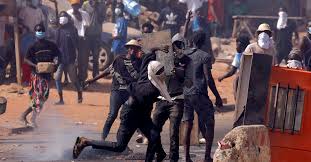
Authorities in Senegal’s southern region of Kolda have suspended public Kankourang ceremonies following a string of violent incidents that left several people dead or seriously injured.
The move comes after a series of tragedies on Sunday, September 21.
In Ngaparou, a Kankourang figure was killed during festivities, while in Colobane, Ziguinchor, a man in his twenties was stabbed during a Diambadong ritual and remains in intensive care.
On the same day in Kolda, a young man on holiday lost his life after a fight during a local “washing” gathering.
Faced with escalating violence, the prefect of Kolda issued a decree on Monday, September 22, banning Kankourang-related cultural activities on public roads.
According to the order, the measure was prompted by “recurring disturbances to public order, traffic blockages and especially the use of bladed weapons or blunt objects which have already caused death.”
The prefect warned that violators would face legal sanctions, with law enforcement tasked with enforcing the suspension.
“The safety of citizens and the tranquility of social life take precedence over the holding of these gatherings,” the prefect’s statement read.
The clampdown follows the arrest of several suspects linked to the weekend’s incidents. Investigations are continuing as authorities seek to contain the unrest.
Kankourang traditions, rooted in Mandingo communities across Senegal’s Casamance region and in neighbouring Gambia, are central to initiation rites for young men. Symbolising protection and discipline, the Kankourang is considered a guardian figure.
Its cultural significance has long been acknowledged internationally. In 2005, UNESCO proclaimed the Mandingo Kankourang a “masterpiece of the oral and intangible heritage of humanity,” and in 2008, it was added to the Representative List of Intangible Cultural Heritage of Humanity.
Yet despite its recognition, tensions often emerge when the ceremonies spill into public spaces. The latest ban in Kolda has reignited debate over how to safeguard tradition while protecting public order.
Some cultural leaders are urging stricter supervision of events rather than outright bans, warning that prohibitions risk eroding a practice central to Mandingo identity. The prefect’s order will remain in force until further notice as authorities and communities search for a lasting solution.



